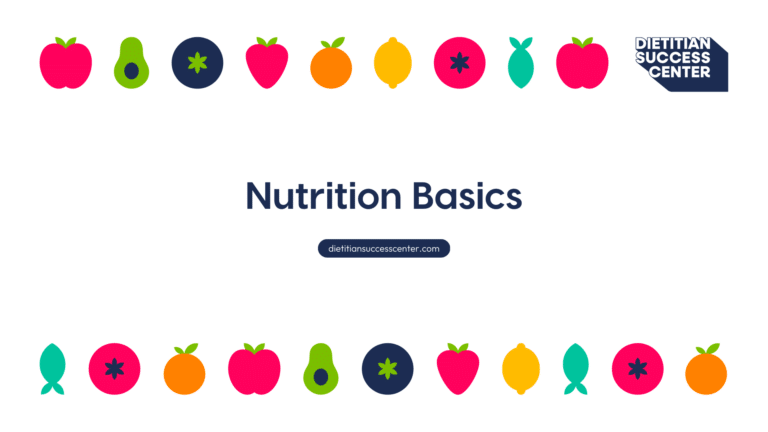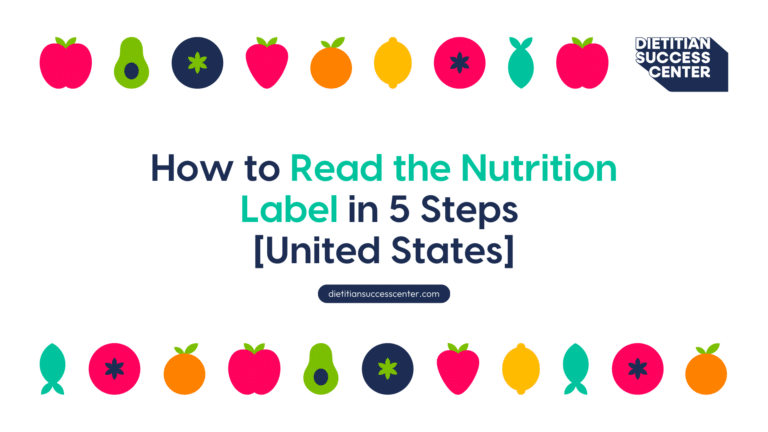

Written by Olivia Farrow, RD, MHSc
Reviewed by Krista Kolodziejzyk, RD, MPH, MBA and Maria Dellanina, RDN
Do you want to empower your clients to make lasting health changes and achieve their nutrition goals? Discover how motivational interviewing for dietitians can transform your counseling sessions!
In this guide, we’ll explore what motivational interviewing (MI) is, the principles behind it, and some practical techniques you can use right away to enhance your nutrition counseling skills. Get your FREE Motivational Interviewing Cheat Sheet here.
Quick Links
What is Motivational Interviewing (MI)?
Motivational interviewing is a client-centered, goal-oriented counseling approach designed to boost an individual’s intrinsic motivation and commitment to change (1,2,3).
Let’s break this down:
Intrinsic Motivation
Intrinsic motivation is the inherent drive to do something because it is interesting or enjoyable, rather than for an external reward or pressure (1).
For example, a person might want to eat healthier because they genuinely value their well-being and want to feel better, not just because their doctor told them to or because they want to lose weight for an event.
Commitment
Commitment to change refers to the client’s dedication to making a change. It’s the difference between thinking about change and taking actionable steps toward it. A committed client is not only motivated, but also invested in the effort and resources needed to achieve their goals (1).
MI helps clients discover their own reasons for change, which are often more powerful and enduring than reasons imposed by others (1,2).
Why Use Motivational Interviewing?
Originally developed for substance use counseling, motivational interviewing is most commonly applied and studied in the areas of substance use, smoking, and HIV risk reduction (1). However, there is also evidence supporting its use for diet, exercise, and diabetes interventions (1):
Benefits of motivational interviewing, for dietitians and their clients:
- Increased self-efficacy related to diet and exercise
- Increased physical activity
- Reduced caloric intake
- Increased fruit and vegetable consumption
For both type 1 and type 2 diabetes, MI has been found to help patients control glucose levels, increase physical activity, and engage in dietary changes. It also enhances self-efficacy and a sense of control over diabetes management (1).
When to Use Motivational Interviewing
Motivational interviewing aligns with the dietetic process and can be applied in almost any nutrition counseling scenario. It is especially useful for individuals who are ambivalent or resistant to making health behavior changes (3).
The Spirit of MI
In counseling settings, we often worry about the words we say. Motivational interviewing recognizes that the atmosphere around the counseling session is more than just words.
MI emphasizes an underlying spirit, including four key principles (2):
- Partnership: MI is a collaborative process where both the counselor and the client are considered experts. The nutrition counselor collaborates with the client to identify potential barriers to dietary changes and brainstorm practical solutions.
- Acceptance: The nutrition counselor accepts the client’s worth and autonomy with affirmations and empathy. This helps clients feel safe to share openly and honestly.
- Compassion: The nutrition counselor has a deliberate and genuine concern for advancing the client’s well-being.
- Evocation: The nutrition counselor helps draw motivation from within the client rather than imposing their own perspectives upon them.
MI Processes
MI processes are guiding principles that help provide structure to the counseling session. These four processes are engaging, focusing, evoking, and planning, and they do not necessarily need to be linear (2).
Engaging
This process focuses on establishing a collaborative and empathetic relationship between the nutrition counselor and the client. The goal is to create a safe and non-judgmental space where the client feels heard and understood. This can include determining the client’s reason for attending the session, providing an overview of what to expect, and asking permission to explore the client’s thoughts and feelings about change.
Focusing
Focusing involves narrowing down the areas of change that the client wants to address and defining specific goals. In nutrition counseling, this might involve exploring the client’s priorities and identifying the particular aspects of their diet they want to modify.
Evoking
The evoking process aims to elicit the client’s own motivations, values, and reasons for change. Counselors can assess readiness to change, explore ambivalence, and evoke language from the client about change.
Planning
Planning involves collaboratively developing strategies and action plans to support behavior change. The nutrition counselor works with the client to explore various options and any barriers to them, set realistic goals, and create a roadmap for achieving those goals.
MI Counseling Skills
OARS
Key counseling skills in motivational interviewing can be described using the acronym OARS: Open-ended questions, Affirmations, Reflective listening, and Summaries (2).
Open-ended Questions
Open-ended questions generate discussion and sharing, rather than just eliciting yes or no responses. They can help explore what is really important to the client.
Affirmations
Affirming helps build rapport with clients, creating a connection and boosting their confidence to change. Affirmations can be about observations, problem-solving abilities, processes, and client strengths.
Reflective Listening
Reflective listening involves active listening, working to understand the core message conveyed by the client, and reflecting that interpretation back to them. This encourages clients to further share their thoughts and fosters an environment conducive to self-exploration.
Summaries
Summaries help organize what has been covered, clarify and reinforce concepts, provide links between concepts and transition to new topics.
Providing Advice & Information: Elicit-Provide-Elicit
Because MI is a client-centered counseling approach, offering advice can seem tricky. The elicit-provide-elicit technique helps. First, ask what the client already knows and what they want to know. Then, provide the information in a neutral way. Finally, check in with the client’s response and interpretation of the information.
Rolling With Resistance
Resistance is normal. To roll with resistance, acknowledge it, use “what” instead of “why,” and ask permission to explore other options.
Putting It All Together
Let’s put it all together with the four processes of MI:
1. Engage: Establish a collaborative and empathetic relationship.
Example: “Hi, my name is ____. I am the dietitian at the clinic. My role here is to help clients work towards their nutritional goals. Is there anything in particular you would like to cover today?”
2. Focus: Narrow down the areas of change and define specific goals.
Example: “Would it be alright with you if I share some dietary changes that might help with your concern and you can tell me which of those strategies appeals to you the most?”
3. Evoke: Elicit the client’s motivations, values, and reasons for change.
Example: “Can you tell me a bit more about how that particular change appeals to you?”
4. Plan: Develop strategies and action plans to support behavior change.
Example: “Would you be interested in hearing other strategies that have worked for clients attempting to make that same change? What might keep you from following through with your plan? What ideas do you have for overcoming those barriers?”
Ready to elevate your nutrition counseling skills with practical, evidence-based techniques? Join the waitlist now for DSC’s Nutrition Counseling and Coaching Certificate Program! This program will help you become more confident with your counseling skills through an easy-to-follow video course, a practical workbook filled with scripts and examples, and monthly Q&A sessions with experienced dietitians.
References
- Martins RK, McNeil DW. Review of Motivational Interviewing in promoting health behaviors. Clin Psychol Rev. 2009 Jun;29(4):283-93. doi: 10.1016/j.cpr.2009.02.001. Epub 2009 Feb 23. PMID: 19328605.
- Bauer, K., Liou, D. “Nutrition Counseling and Education Skill Development: 4th Edition” 2021
- Resnicow K, McMaster F. Motivational Interviewing: moving from why to how with autonomy support. Int J Behav Nutr Phys Act. 2012 Mar 2;9:19. doi: 10.1186/1479-5868-9-19. PMID: 22385702; PMCID: PMC3330017.






![How to Read a Nutrition Label in 5 Simple Steps [Health Canada Nutrition Facts Label]](https://dietitiansuccesscenter.com/wp-content/uploads/2024/05/2-1-768x432.png)
![[YouTube] For Kids How to Read a Nutrition Label - Canadian](https://dietitiansuccesscenter.com/wp-content/uploads/2024/05/3-2-768x432.png)
